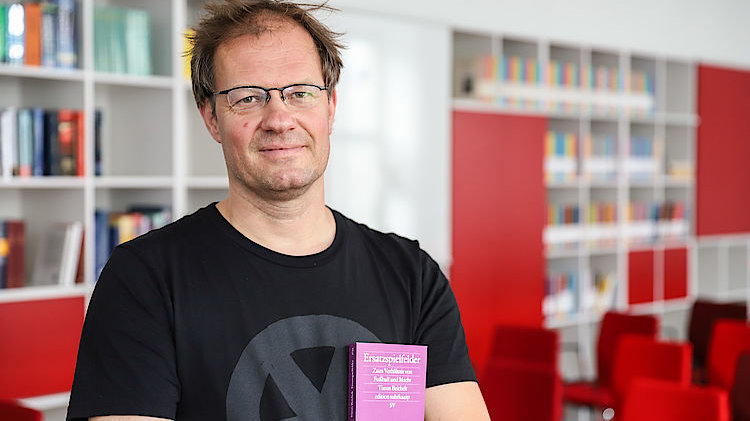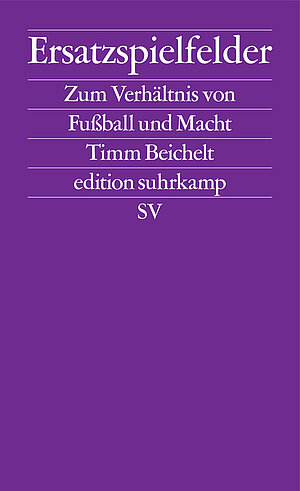“The field of football has its own logic”
In his recently published essay Ersatzspielfelder. Zum Verhältnis von Fußball und Macht (Suhrkamp 2018), author Timm Beichelt examines the social significance of football in the European context. In doing so, he aims to make a fundamental statement about the relationship between society, power, and politics.

The title of your book is "Ersatzspielfelder" [a word which literally can mean "replacement playing fields", "surrogate playing fields", or "compensatory playing fields", but can also be translated as "other fields of engagement"]. What do you mean by that?
The title is a metaphor - one which I use in part because metaphors always have several meanings. One aspect of the "other field of engagement" is that societal conflicts of the late modern age are, in a sense, played out vicariously in the field of football. I am thinking above all about the conflict between individualism and community values. On one side there is the individualistic paradigm with its emphasis on competition, constant achievement and self-exploitation. On the other, there is communitarianism, with its demand that the individual also be able to function in social and community contexts. It's impossible to deliver on all of that. Football provides a context where it seems possible to reconcile individualism and communitarianism.
Your book is about the relationship between football and power. Where, in that context, does Russia fit in?
First of all, Russia was one important reason to write the book, since the 2018 World Cup is taking place there. Additionally, the way football is organised in Russia, with close ties to the state - through, for example, having state-owned companies as sponsors - is paradigmatic for a particular segment of international football. Russia can be seen as a sort of ideal model within the FIFA regime, one which depends on having maximal resources and minimal political opposition. One point of criticism in the book is that the parameters of action within Western leagues in democratic states are becoming increasingly similar to those in the autocratic sphere, perhaps without them even realising it.
What is the role of sponsorship in Russian sport, and in Russian football in particular?
My thesis here is that there is a quite rational strategy at work. Various sectors of Russia's domestic and foreign policy are reflected in their politics of football. You can see that in the way that they invest in symbols of the military and the intelligence services at CSKA and Dynamo Moscow. The oligarch-like private business community without political ambitions clusters around Spartak Moscow and a few other clubs. The Putinism of the youth movement is put on show at Locomotive Moscow. And you can also see that the Russian foreign trade bank (VTB) is involved in sponsorship in the so-called "near abroad". On top of that, you also have companies like Gazprom and Rosneft, so ultimately, you have a tableau or mosaic of relatively plausibly-composed soft foreign policy.

Is it possible to compare the political significance of football in Russia and in other countries?
Yes. According to my analysis, the model in Russia is ultimately more restrained than it is in, say, Ukraine or France, or in some cases in England (where the Premier League is concerned). There, unlimited flows of capital from dark channels are the rule, but in Russia, they have managed to curtail the worst excesses in the course of the last twenty years. By that, I don't mean to say that Russia is a role model. But nonetheless, it represents a plausible way for an authoritarian state to deal with a large concentration of economic capital. Often, we expect football to be a vehicle for democracy-like norms. But that is asking too much of this field. We can see that in the fact that a lack of transparency, large concentrations of power and a lack of control mechanisms can be found everywhere in professional football - for example, in the Premier League in England, at FIFA in Zurich, at Paris Saint-Germain, and at other French clubs that are dependent on the funds of Russian billionaires. An autocratic system, of all things, has managed to counteract these excesses with a degree of plausibility. I find that interesting in the field of football, because it is rational. In saying that, I don't mean to promote anti-democratic values more generally. But I would like to insist that the field of football has its own logic, and that you can't assume that through football, democratic values will spread into the rest of society. That can happen, but it isn't certain to happen.
In your book, you focus on the "football nations" of Germany, France and Russia. How did you choose these examples?
The goal there was to illustrate certain phenomena in the field of football with particularly well-suited case studies. I take Germany my starting-point because I know German football best, and because here, I can best identify the paradigm of achievement and the mechanisms that are used to bring together achievement and communitarianism. I used the French example in order to show that football's much-vaunted ability to promote integration only works on one condition: that is, on the condition of sporting success. Germany has had that success in the last twenty years, so integration via football has worked pretty well here. In France, that wasn't the case; there were ups and downs. And through that example, I try to show that integration can also be negatively coded if there are disappointments in football. And I chose the Russian example in order to illustrate the intertwining of autocracy and football, which is on particularly clear display there.
The interview was conducted by Stephanie Alberding, communications coordinator at ZOiS.
Prof. Dr. Timm Beichelt is Professor of European Studies in the Faculty of Cultural Studies of the European University Viadrina in Frankfurt an der Oder.